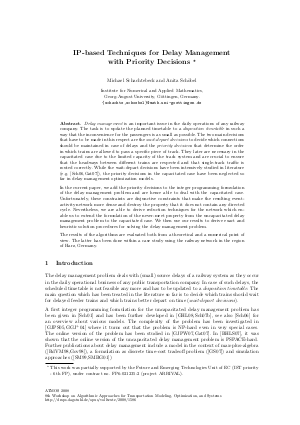IP-based Techniques for Delay Management with Priority Decisions
Authors Michael Schachtebeck, Anita Schöbel
-
Part of:
Volume:
8th Workshop on Algorithmic Approaches for Transportation Modeling, Optimization, and Systems (ATMOS'08) (ATMOS 2008)
Part of: Series: Open Access Series in Informatics (OASIcs)
Part of: Conference: Symposium on Algorithmic Approaches for Transportation Modelling, Optimization, and Systems (ATMOS) - License:
 Creative Commons Attribution-NonCommercial-NoDerivs 3.0 Unported license
Creative Commons Attribution-NonCommercial-NoDerivs 3.0 Unported license
- Publication Date: 2008-09-24
File

PDF
OASIcs.ATMOS.2008.1586.pdf
- Filesize: 326 kB
- 16 pages
Document Identifiers
Subject Classification
Keywords
- Public transportation
- delay
- integer programming
- never-meet property
- heuristics
- preprocessing
Metrics
- Access Statistics
-
Total Accesses (updated on a weekly basis)
0Document
0Metadata
Abstract
Delay management is an important issue in the daily operations of any railway company. The task is to update the planned timetable to a disposition timetable in such a way that the inconvenience for the passengers is as small as possible. The two main decisions that have to be made in this respect are the wait-depart decisions to decide which connections should be maintained in case of delays and the priority decisions that determine the order in which trains are allowed to pass a specific piece of track. They later are necessary in the capacitated case due to the limited capacity of the track system and are crucial to ensure that the headways between different trains are respected and that single-track traffic is routed correctly. While the wait-depart decisions have been intensively studied in literature (e.g. [Sch06,Gat07]), the priority decisions in the capacitated case have been neglected so far in delay management optimization models. In the current paper, we add the priority decisions to the integer programming formulation of the delay management problem and are hence able to deal with the capacitated case. Unfortunately, these constraints are disjunctive constraints that make the resulting event activity network more dense and destroy the property that it does not contain any directed cycle. Nevertheless, we are able to derive reduction techniques for the network which enable us to extend the formulation of the never-meet property from the uncapacitated delay management problem to the capacitated case. We then use our results to derive exact and heuristic solution procedures for solving the delay management problem. The results of the algorithms are evaluated both from a theoretical and a numerical point of view. The latter has been done within a case study using the railway network in the region of Harz, Germany.
Cite As Get BibTex
Michael Schachtebeck and Anita Schöbel. IP-based Techniques for Delay Management with Priority Decisions. In 8th Workshop on Algorithmic Approaches for Transportation Modeling, Optimization, and Systems (ATMOS'08). Open Access Series in Informatics (OASIcs), Volume 9, pp. 1-16, Schloss Dagstuhl – Leibniz-Zentrum für Informatik (2008)
https://doi.org/10.4230/OASIcs.ATMOS.2008.1586
BibTex
@InProceedings{schachtebeck_et_al:OASIcs.ATMOS.2008.1586,
author = {Schachtebeck, Michael and Sch\"{o}bel, Anita},
title = {{IP-based Techniques for Delay Management with Priority Decisions}},
booktitle = {8th Workshop on Algorithmic Approaches for Transportation Modeling, Optimization, and Systems (ATMOS'08)},
pages = {1--16},
series = {Open Access Series in Informatics (OASIcs)},
ISBN = {978-3-939897-07-1},
ISSN = {2190-6807},
year = {2008},
volume = {9},
editor = {Fischetti, Matteo and Widmayer, Peter},
publisher = {Schloss Dagstuhl -- Leibniz-Zentrum f{\"u}r Informatik},
address = {Dagstuhl, Germany},
URL = {https://drops.dagstuhl.de/entities/document/10.4230/OASIcs.ATMOS.2008.1586},
URN = {urn:nbn:de:0030-drops-15862},
doi = {10.4230/OASIcs.ATMOS.2008.1586},
annote = {Keywords: Public transportation, delay, integer programming, never-meet property, heuristics, preprocessing}
}
